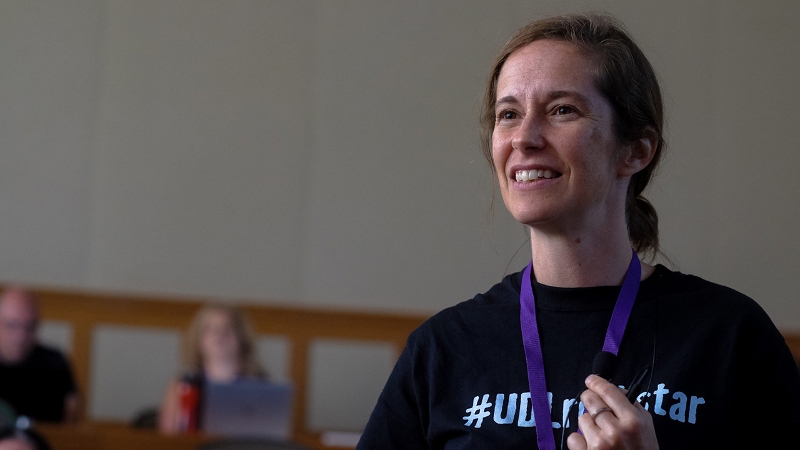‘Unlearning’ Invites Educators to Re-Think Practices

Allison Posey presenting at CAST's UDL Symposium
Allison Posey knows how difficult it can be to put new theory into practice in the classroom. “Changing your practice is really hard,” says Posey, who co-authored “Unlearning” with Katie Novak.
Above all, they hope “Unlearning” will encourage educators to re-think certain “tried and true” teaching practices using Universal Design for Learning principles.
“We have to take these steps to unlearn some of our ineffective practices in order to trade up for new ways of teaching,” Posey says.
In their new CAST book, the UDL experts show how a shift in mindset and change in teaching methodology reduce barriers so all students can succeed.
Posey, a curriculum and design specialist at CAST, is passionate about translating current neuroscience research into practical application for educators.
“We teach in a system that has an old mindset of how the brain learns and works,” Posey says. “With a better understanding about learning in the brain, we can change how we design our classrooms.”
“From what we know now about the neuroscience of the learning brain, there’s almost limitless potential in what students can or can’t do,” Posey says. “It’s often our own mindset that holds us back.”
Unlearning Cycle Involves Five Steps
“UDL is an amazing framework to support conversations about lesson design that can be used among teachers and neuroscientists, parents and students,” Posey says.
As a life sciences teacher, Posey experienced a disconnect between knowledge about the brain and how to practically apply it to students.
Her quest to make that connection led her to take a UDL course taught by CAST co-founder David Rose at the Harvard Graduate School of Education.
After that, she obtained a master’s degree from the school’s Mind, Brain, and Education program. “I started to get how UDL could help me make those changes I really wanted,” Posey says.
UDL strategies require educators to examine a goal and recognize there are different ways to approach it. For instance, Posey says it’s important to challenge any barriers, such as when students get stuck or aren’t included.
In “Unlearning,” the authors take readers through the five-step Unlearning Cycle: understanding variability, knowing your goal, transforming tried-and-true techniques, prioritizing engagement and scaffolding expert learning.
As they state in their book, the unlearning process is one of self-assessment and reflection, destruction, and change. It is also one of learning and growth.
Helping Educators Unlearn With UDL
At CAST, Posey leads learning programs about how to integrate current understandings from brain science into instructional practices. She works on research projects, designing content so all students can access and engage with it. She also works with teachers from all levels and content areas and hosts a free UDL webinar series.
In addition, she works as an adjunct professor at Lasell University, teaching several online courses. Posey’s first book “Engage the Brain” details how educators can use emotional research in their teaching strategies.
As the mom of two teenagers, Posey knows UDL carries implications beyond the classroom. She says the principles can be applied in workforce development and even in the home.
The Posey family enjoys exercising, hiking and watching sunsets together. "They also love desserts and could be considered dark chocolate snobs," Posey adds with a laugh.
Self-Reflection Key to Unlearning

Posey's children playing on the beach.
Posey says examining your mindset and the effectiveness of your teaching practices is an essential part of the “unlearning” process.
As she and Novak point out, it’s easy to fall back on patterns and methods that may not reflect current understanding or the research of learning and the brain.
“You have to actively work and take these steps to unlearn these habits,” Posey says.
For instance, unlearning includes discarding outdated labels, such as “visual learner,” “left-brained thinker” or “gifted and talented.”
While labels can help to categorize and understand learning, Posey says they can often lead to a set mindset or lower expectations.
“Often, by the time students are in kindergarten, they start to be separated and labeled, and then they get on these tracks that are almost impossible to recover from,” Posey says. “It’s just not OK.”
Moreover, some practices remain in place simply because it’s always been done that way.
“If you design for equity, you need to rethink some of those practices,” Posey says. “We really try to push some of those hard questions, but in ways that value and respect the hard work teachers are already doing.”
The Goal? Developing Expert Learners
Posey knows students can become expert learners because she’s observed it in her classrooms and heard educators’ astounding success stories.
“We’ve seen remarkable things,” Posey says. For instance, she cites students’ progress, engagement and academic outcomes sought by states and school districts, nationally and internationally.
“I would love for schools to be places where every single student is included and engaged in meaningful learning,” Posey says. “I worry they are places where students learn to be compliant and follow the school rule. It doesn’t have to be that way.”
To sum up, current research of the learning brain will benefit students only if educators put that knowledge into practice.
“If we’re not meeting the needs of all our students, why are we in education?” Posey asks. “It’s about developing these expert learning skills. What we know about the brain is every brain can do it.”

Order your copy today!
Unlearning is available in paperback ($24.99, 128 pages, 6x9″) and EPUB formats ($24.99).
